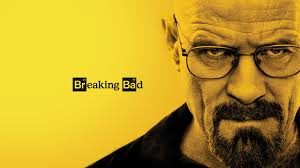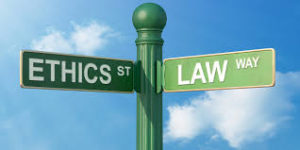When Lawyers Cross the Line – Breaking Bad Under the Law
 While reading the Embraer settlement documents, I read over the facts implicating a senior legal executive and his/her involvement in the Embraer bribery scheme. Truthfully, I had a slight gasp as I read about a fellow lawyer crossing the line – from lawful to unlawful.
While reading the Embraer settlement documents, I read over the facts implicating a senior legal executive and his/her involvement in the Embraer bribery scheme. Truthfully, I had a slight gasp as I read about a fellow lawyer crossing the line – from lawful to unlawful.
Not only did the Embraer legal executive know about the bribery scheme, the executive was the one who came up with the brilliant idea to use third parties to funnel the bribes to foreign government officials. What a genius.
Again, I am always perplexed by lawyers who cross the line, or as I like to say with reference to my favorite television show – lawyers who break bad. (Of course, you have to enjoy Saul’s new show, Better Call Saul).
We have too many examples of lawyers breaking bad. It reminds me again of the importance of an independent chief compliance officer. For some reason, lawyers get caught up in these schemes and confuse problem-solving solutions with law-abiding solutions.
Let’s consider a few recent examples. In VimpelCom we had an in-house attorney who approved the two proposed acquisitions through a shell company owned by the daughter of the Uzbekistan President. The in-house attorney never asked for, never reviewed, nor did he/she learn the beneficial owner of the shell company. Without this critical piece of information, there is no way an attorney can ever approve a due diligence review.
Instead, the in-house attorney gave into internal business pressure and signed off on the acquisitions. The rest is history and now VimpelCom and its parent company, are looking at enforcement actions totaling $2 billion.
Even outside of the FCPA context, we have the GM case where not only was one attorney crossing the line but an entire group of attorneys were dedicated to avoiding disclosure of problems with the GM ignition switch. For years, the attorneys knew about the problem, took minimal steps to correct the problem, but spent hours and hours in fighting litigation and disclosure of the problem internally.
The GM case is infuriating not because lawyers crossed the line but because their transgressions directly caused the deaths of many innocent consumers. A lawyer who breaks bad rarely causes such harm to innocent victims – the GM case stands as a testament to illegal and unethical conduct that caused death.
These case examples underscore two important points. Lawyers are bound to their professional ethics – that is far different that a chief compliance officer’s commitment to ethical conduct. Business ethics is a lot different than legal ethics. A lawyer’s ethical code is a set of requirements to zealously represent their client’s interests and  maintain attorney-client privilege. It is not a prescription for doing the right thing (as we well know).
maintain attorney-client privilege. It is not a prescription for doing the right thing (as we well know).
In contrast, a chief compliance officer has a duty to promote and embed a culture of ethics. Business ethics is a goal, and is fast becoming a requirement for an effective ethics and compliance program. Lawyers have a different set goals surrounding legal compliance. CCOs are dedicated to ethical compliance – meaning “to do the right thing.”
It is easy to imagine how a CCO would have reacted to the GM situation, the VimpelCom proposed transaction, and the Embraer issue resulting in the use of third parties to funnel bribes. A CCO inside the C-Suite and at the business table is an important counterweight to decision-making that led to lawyers and business people breaking the law.
















“These case examples underscore two important points. Lawyers are bound to their professional ethics – that is far different that a chief compliance officer’s commitment to ethical conduct. Business ethics is a lot different than legal ethics. A lawyer’s ethical code is a set of requirements to zealously represent their client’s interests and maintain attorney-client privilege. It is not a prescription for doing the right thing (as we well know).”
I would argue a little differently. I think it is because either (1) those are bad lawyers or (2) because the management took the final decision despite legal opinion.
As to lawyers, today simple abstract legal opinion is not enough. A good lawyer has to tailor its advice to the particular business, its evolving model, vision and mission, yearly business goals, and of course risk appetite of the company as well as its code of conduct. Why do you need a lawyer who will give you 5 options, 2 of which do not meet risk appetite of the company and the declared ethical standard and then have another person (CCO) who would say that these 2 options are not fitting the company. You would rather prefer a good lawyer who would take into account the company’s “promisses” in the Code of Conduct from the beginning. It is correct that lawyers are bound by “protecting its clients interests”. However, suggesting an unethical or illegal options is not at all a protection. In contrast, it is bringin more risks to the clients some of which may create bigger problems in the long run. For these reasons I think that it is an incompetent advice when it is not tailormade for a particular client’s needs.
Of course, GC is a counsel and not the ultimate decision maker. But it is his job to advocate that if we take Option 1 now we will violate our code of ethics and we risk ruining trust with all stakeholders (employees, customers, regulators, investors) if they get to know… This will create turnover of employees and loosing talent, reputational damages, not being able to receive credit from law enforcement authorities for having the Compliance Program, will scare away investors.
Interesting piece Michael, thank you. I agree that your characterisation of in-house lawyers can sometimes be true but it is not a characterisation which fits with their professional rules, in England and Wales at least. Here lawyers solicitors have obligations to uphold the rule of law and the proper administration of justice; act with integrity; not allow their independence to be compromised; and to act in the best interests of each client. Where there is a conflict between those principles, the one which best promotes the public interest in the administration of justice is what trumps. No enough of my bretheren in practice understand this, but some do. In fact, when we looked at ‘mapping the moral compass’ of in-house lawyers we found a range of approaches some consistent with your view and some consistent with stronger ethical leadership. The latter group need help to instantiate a more independent, mature and sustainable notion of professional ethics and the former group need challenging. You can read the research here if you are interested: http://www.ucl.ac.uk/laws/law-ethics/cel-news/2016/mapping-the-moral-compass-report
I have also been collating examples of lawyer involvement in alleged wrongdoing. It’s not comprehensive but I hope this might provide a useful resource for those interested in the area. https://theethicsroom.wordpress.com/
so nice to see and read some good truths